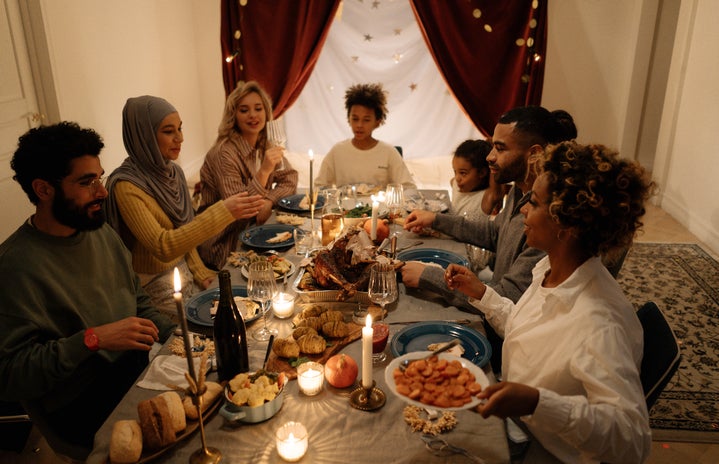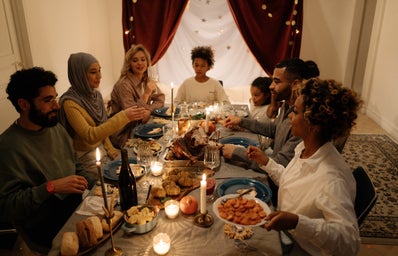Bloody ketchup baths, pea soup, miniature foie gras tarts… So, is “rich people food” supposed to sound appetizing? I don’t know about you guys, but I’m feeling a bit ill. Still, might these dishes be worth making?
I have never read a psychological fiction novel—perhaps never any novel—in which dinner played as ingenious a role as it does in Donna Tartt’s The Secret History. The inverted detective story follows a group of six undergraduate students who, in an attempt to recreate a ‘bacchanal’ (that is, a Greek ritual involving alcohol, sex, tearing apart wild animals and a slew of other hedonistic activities), accidentally murder an innocent passerby. The aftermath of this ordeal involves amicide, addiction, fleeing the country and more. Needless to say, The Secret History is not a book to be taken lightly. The question is: how does something so mundane as dinner factor into such a chaotic tale? The answer: quite seamlessly.
The central six students are heavily characterized by their socioeconomic position and fascination with the classics. Wealthy, extravagant and generally awful people—think nepo-babies on steroids—Tartt did not write The Secret History to give readers a likable cast. Rather, her novel critiques academic elitism, excessive consumption and classism. We get our first taste (see what I did there?) of their foodie-elitism as they prepare for a dinner party. One character, the bespectacled and gloriously queer Francis, would “order all kinds of food from the grocery store and leaf through cookbooks and worry for days about what to serve, what wine to serve with it, which dishes to use, what to have in the wings as a backup course should the soufflé fall.”
Let’s all embrace our inner Francis for a moment and take a closer look at four of the so-called delectable dishes of the upper class featured in The Secret History:
Pea Soup
“Henry ordered an enormous dinner—pea soup, roast beef, a salad, mashed potatoes with gravy, coffee, pie—and ate it silently and with a great deal of methodical relish.”
Starting off easy, this meal more resembles a Thanksgiving feast than any Michelin-star restaurant. Pea soup is pretty simple to make, mainly demanding vegetables, herbs and a strong emulsifier. It turns a rather unappetizing green color, but pairing it with the plethora of sides Henry orders might just make it a win.
Miniature Foie Gras Tarts
“Dinner was set out at seven, an unappetizing combination of gourmet carry-out–orzo salad, duck in Campari, miniature foie gras tarts.”
I’m a little more skeptical about this one. Foie gras–duck liver–has never been that appealing to me. Also, all the recipes I’ve looked at seem to entail lots of work. Still, if you’re looking to impress your guests with something indubitably fancy, this dish is the way to go. I also find it funny that it is referred to as “carry-out” in The Secret History. Imagine considering duck and Campari as carry-out? Wouldn’t be me…
Prairie Oysters
“The yolk quivered, gently, in its bloody bath of ketchup and Worcestershire.”
When have you ever heard of food described as bloody and quivering? Um, yikes! This drink is known as the age-old hangover cure, though the strange combination of ingredients seem like they would make someone feel more nauseated, rather than less. Worcestershire sauce, vinegar, hot sauce, a raw egg yolk… Yeah, it would take a killer hangover to convince me to try this one.
Wacky Cake
“The neighbors had made: tuna casseroles, gelatin molds in Tupperware, and a frightful dessert called a ‘wacky cake’ that I am at a loss to even describe.”
Uh, yeah, I’m not sure if I’ll be able to describe this one either. Based on my research, Wacky Cake, also nicknamed Depression Cake, originated during the Great Depression when ingredients were scarce and desserts even more so. It is essentially a chocolate cake made without milk and eggs. I’ve never made it, but its retained popularity indicates it must be at least a little yummy.
Overall, this dark academia staple writes about food in a manner that equally appeals to readers and repulses them. I, for one, felt both of these senses at numerous points throughout The Secret History. The characters’ dinners embody the height of their indulgences while heavily criticizing the elitist culture that surrounds ornate and exotic dishes. Duck tarts? No thanks, I’ll stick to my In-N-Out cheeseburger. But these recipes are certainly fun to experiment with, especially if you want to host a Donna Tartt-themed dark academia dinner party.


